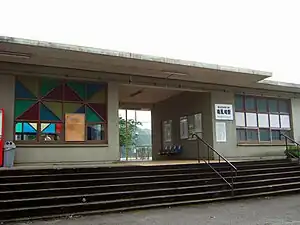Haenosaki Station
Haenosaki Station (南風崎駅, Haenosaki-eki) is a railway station in Haenosaki-cho, Sasebo, Nagasaki Prefecture, Japan. It is operated by JR Kyushu and is on the Ōmura Line.[1][2]
Haenosaki Station 南風崎駅 | |
|---|---|
 Haenosaki Station in 2008 | |
| General information | |
| Location | Japan |
| Coordinates | 33°05′13″N 129°48′03″E |
| Operated by | |
| Line(s) | ■ Ōmura Line |
| Distance | 5.6 km from Haiki |
| Platforms | 2 side platforms |
| Tracks | 2 + 1 siding |
| Construction | |
| Structure type | At grade |
| Accessible | No - platforms linked by level crossing with steps |
| Other information | |
| Status | Unstaffed |
| Website | Official website |
| History | |
| Opened | 20 January 1898 |
| Passengers | |
| FY2014 | 18 daily |
| Location | |
 Haenosaki Station Location within Japan | |
Lines
The station is served by the Ōmura Line and is located 5.6 km from the starting point of the line at Haiki.[3] Besides the local services on the line, some trains of the Rapid Seaside Liner also stop at the station.[4]
Station layout
The station consists of two side platforms serving two tracks with a siding branching off track 1. The station building, a steel frame structure of modern design, is unstaffed and the waiting room is closed. Access to the opposite side platform is by means of a level crossing with steps at both ends.[2][3][5]
 View of the platforms and tracks. Note the level crossing.
View of the platforms and tracks. Note the level crossing.
Adjacent stations
| ← | Service | → | ||
|---|---|---|---|---|
| Ōmura Line | ||||
| Huis Ten Bosch | Local | Ogushigō | ||
| JR Kyushu Rapid | ||||
| Huis Ten Bosch | Seaside Liner (some trains) | Ogushigō | ||
History
The private Kyushu Railway, in building a line to Nagasaki, had opened a track southwards from Tosu to Saga and Takeo (today Takeo-Onsen) by 1895. By 1897, the track had reached Haiki. In the next phase of expansion, the track was extended towards Ōmura which opened as the new terminus on 20 January 1898. Haenosaki was opened on the same day as an intermediate station between Haiki and Ōmura. When the Kyushu Railway was nationalized on 1 July 1907, Japanese Government Railways (JGR) took over control of the station. On 12 October 1909, track from Tosu through Haiki to Nagasaki was designated the Nagasaki Main Line. On 1 December 1934, another route was given the designation Nagasaki Main Line and the track from Haiki, through Haenosaki to Isahaya was designated the Ōmura Line. With the privatization of Japanese National Railways (JNR), the successor of JGR, on 1 April 1987, control of the station passed to JR Kyushu.[6][7]
At the end of the Second World War, Japanese soldiers and civilians repatriated from overseas were housed in nearby Hario Island. After a period of quarantine, they were then transported home in special trains from Haenosaki Station. This part of the station history is written about on a sign board at the station.[5]
Passenger statistics
In fiscal 2014, there were a total of 6,423 boarding passengers, giving a daily average of 18 passengers.[8]
Environs
- Haenosaki Post Office
- Sasebo City Office Miya Branch
See also
References
- "JR Kyushu Route Map" (PDF). JR Kyushu. Retrieved 3 March 2018.
- "南風崎" [Haenosaki]. hacchi-no-he.net. Retrieved 21 March 2018.
- Kawashima, Ryōzō (2013). 図説: 日本の鉄道 四国・九州ライン 全線・全駅・全配線・第5巻 長崎 佐賀 エリア [Japan Railways Illustrated. Shikoku and Kyushu. All lines, all stations, all track layouts. Volume 5 Nagasaki Saga area] (in Japanese). Kodansha. pp. 26, 73. ISBN 9784062951647.
- "南風崎" [Haenosaki]. JR Kyushu official station website. Retrieved 21 March 2018.
- "大村線・南風崎駅に行ってきました" [I went to Haenosaki Station Ōmura Line]. Ameblo.jp. 2 August 2015. Retrieved 21 March 2018. Blog entry with good photographic coverage of station facilities.
- Ishino, Tetsu; et al., eds. (1998). 停車場変遷大事典 国鉄・JR編 [Station Transition Directory – JNR/JR] (in Japanese). Vol. I. Tokyo: JTB Corporation. pp. 22–3, 225, 227. ISBN 4-533-02980-9.
- Ishino, Tetsu; et al., eds. (1998). 停車場変遷大事典 国鉄・JR編 [Station Transition Directory – JNR/JR] (in Japanese). Vol. II. Tokyo: JTB Corporation. p. 737. ISBN 4-533-02980-9.
- "第63版(平成28年)長崎県統計年鑑" [Nagasaki Prefecture Statistics Yearbook 63rd Edition 2016]. Nagasaki Prefectural Government website. Retrieved 16 March 2018. See table at section under Transportation and Communications.
External links
- Haenosaki Station (JR Kyushu)(in Japanese)